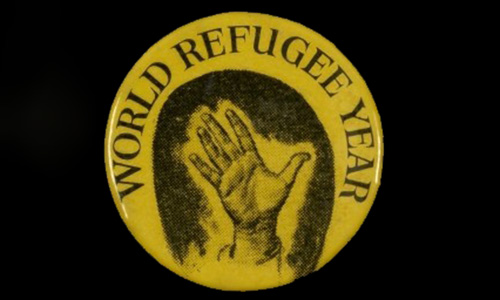
The Humanitarian Archive
Date range: 1960 – present
The Humanitarian Archive provides a permanent home for collections connected to humanitarianism and related subjects.

The archive is a unique partnership between the University of Manchester Library and the Humanitarian and Conflict Response Institute. Its remit covers the work of individuals and small non-governmental organisations (NGOs) working in international aid and war and natural disaster response, and cultural artefacts relating to humanitarians, with a focus on changes in humanitarian practice and archivally underrepresented views and events.
The Archive was launched in 2021 and currently works closely with the HCRI’s Developing Humanitarian Medicine project, which examines the development of humanitarian medicine over the past 50 years.
The archive covers medical work, aid and supply distribution, displaced people, conflict, human rights, famine relief and humanitarian fundraising carried out in a wide range of countries across Asia, Europe, Africa and South America. Browse the collection descriptions below to find out more:
Tony Redmond Collection
The personal collection of Professor Tony Redmond, medical doctor, humanitarian and the founder of UK-Med, the UK’s Emergency Medical Team. This collection covers Redmond’s entire emergency medical career, from the 1980s-2010s, including his work during the earthquakes in Armenia in 1988 and Kurdistan in 1991, the 1995 Cape Verde volcano eruption, the Lockerbie Air Disaster and the Bosnian war.
Elizabeth Wilson Collection
The correspondence, photographs and diaries of Elizabeth Wilson (1909-2000), founder of the Huddersfield Committee for Famine Relief (Hudfam), pacifist and Oxfam activist. The collection details her activism and fundraising in the UK and internationally, including in Hong Kong and India. These papers complement the archives related to Hudfam and Wilson which are deposited in the West Yorkshire Archive Service. Access the catalogue here.
British Medical Team Collection
Photographs, newspaper clippings and correspondence collected by members of the British Medical Team sent by the British government to work in a hospital in Saigon (Ho Chi Minh City, Vietnam) during the Vietnam War.
Ron Ockwell Papers
Papers collected by Ron Ockwell, humanitarian and consultant, throughout the course of his work from 1980s-2000s. Ockwell worked with several organisations, including UNICEF, the World Food Programme (WFP), the Food and Agriculture Organization (FAO), and the World Health Organization (WHO) to create guidelines for humanitarian work. His archive covers topics of food security and food aid, disaster response, healthcare and emergency preparedness, across several countries, particularly Bangladesh, Ethiopia and Cambodia.
Antonio Donini Papers
Letters, reports, grey literature and publications relating to the work and research of Antonio Donini, who worked on humanitarian aid and refugee resettlement programmes in Afghanistan for the United Nations during the late 1980s to early 2000s.
Jonathan Falla Collection
The diaries, published works, photographs and correspondence of Jonathan Falla, author and former humanitarian aid worker. The collection covers Falla’s literary output and his work as a nurse and coordinator in India, Indonesia, Uganda, Nicaragua, El Salvador, Burma, and Sudan, spanning 1974-1991.
Norah Niland Papers
The personal papers of Norah Niland, former Director of Human Rights in the UN Assistance Mission in Afghanistan, covering the 1980s-2000s. The collection consists of reports, minutes, policy documents, grey literature and correspondence, which relates primarily to Niland’s time in Afghanistan but also her work in the refugee camps on the Thai Cambodian border in the 1980s, and her research on landmines.
World Refugee Year Collection
A collection of ephemera, memorabilia and correspondence relating to World Refugee Year 1959-1960, collated by Professor Peter Gatrell over the course of his research for his book Free World? The Campaign to Save the World's Refugees, 1956–1963. Access the catalogue here.
Roger Briottet Collection
The personal archive of Roger Briottet, a legal expert and humanitarian activist who worked extensively in Ethiopia and Eritrea in the 1980s, during the war and ensuing famine and criminal trials. His papers also cover his work in Togo, Burundi, Algeria, South America and Sudan.
Further information
To find out more about the Humanitarian Archive, please contact Flora Chatt, Humanitarian Archivist.
To discuss how this archive will contribute to the scholarship of humanitarianism and humanitarian aid, please contact Professor Bertrand Taithe.
Blog posts
- Introducing the Humanitarian Archive
- Elizabeth Wilson’s tea cosy
- Ron Ockwell: A guiding hand for humanitarian aid
Useful links
- The Developing Humanitarian Medicine project
- The Humanitarian and Conflict Response Institute (HCRI)
Related subject pages
- Ahmed Iqbal Ullah RACE Centre Collections
- Christian Brethren Archive
- History of Medicine Collections
- History of Science and Technology Collections
- Maps, Travel and Discovery Collections
- Methodist Archives and Research Collections
- Military, Colonial and International History Collections
- Social and Political History collections
